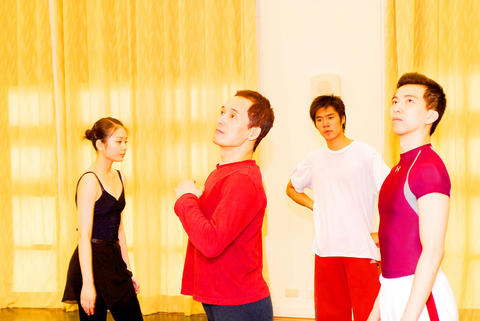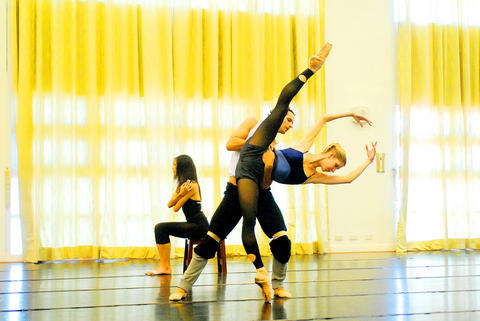Allen Yu (余能盛) feels a close connection with Peter Tchaikovsky. The Taiwanese ballet dancer and choreographer says he loves the 19th-century Russian composer's music, which he has frequently used in his own choreography, and he has read lots of biographies of him.
Last year he gave us a glimpse into the tortured composer's life by restaging his 1998 ballet, Tchaikovsky - None But the Lonely Heart for the Water Reflection Dance Ensemble. This year he is expanding on some of the themes raised in that work for When Ballet Meets Tchaikovsky at Taipei's Metropolitan Hall.
He's been hard at work for the past month, using his vacation time from the Opera House in Graz, Austria - where he is the deputy ballet director and choreographer - to put the finishing touches on three new pieces that make up Ballet Meets Tchaikovsky.

PHOTOS: COURTESY OF CHAMBER OF BALLET TAIPEI
Yu is also a man with a mission. He wants to raise the standards of ballet dancers in this country; standards that he says have sadly declined in recent years.
The situation "is even worse than 20 years ago before I went to Europe. Full-length ballets - no one does them here anymore so ballet dancers don't have the experience, the technique," he said. " We need to build up the dancers here, so I am doing my best to help build up the system."
For the dancers who auditioned for him during a brief visit he made in April, that has meant a lot of hard work. He selected 19 dancers and since he came back to Taipei at the beginning of last month, they have all been putting in long days. He said he told them to drop everything else, no outside classes, no other jobs.

"From 9 [am] to 10:30 [am] we have daily class. After that we have rehearsal until 5pm. The movements [in his ballets] are very fast, so you need strong feet and strong technique," he said. "This is how we dance in Europe. But the dancers here aren't used to this."
As he did last year, Yu has brought his soloists from Europe. Philippines-born Ardee Dionisio, who is a soloist with the Graz Opera House, was a standout in last year's production. Daniel Cimpean, a Romanian soloist with the Darmstadt Staatstheater in Germany, danced here several years ago in Yu's production of The Lady of the Camellias. Two new faces are from the National Ballet of Hungary: Bajari Levente is a principal dancer with that company and Pazar Krisztina is a soloist.
Tchaikovsky's music has long been a favorite of ballet masters and choreographers. Yu selected some pieces that will be familiar to ballet audiences, and one that is not. The first piece he used is the Concerto for violin in D, also known as Serenade, which George Balanchine used for his famous work for the New York City Ballet. The second piece is the Piano Concerto No 1 op.23, and the third is Symphony No 4 in F minor op.36, which Yu said gave him the biggest challenge - and headaches.
The three ballets that make up When Ballet Meet Tchiakovsky each tell a separate story, but Yu says that by the end, their connection is clear.
The first is a meditation on spiritual love, of living your life hemmed in by society, "like a bird in a cage," Yu said.
In the second piece, he said, the soloist is "like a bird looking for its way to freedom." In the third, the bird is finally free to fly away from its cage, he said - but not necessarily happier for it.
Yu says he loves Tchaikovsky's music for its combination of romance and sadness and because it provides him "with limitless imagination."
"It provokes me so much that I want to present my inner feelings on stage," he said.

In the March 9 edition of the Taipei Times a piece by Ninon Godefroy ran with the headine “The quiet, gentle rhythm of Taiwan.” It started with the line “Taiwan is a small, humble place. There is no Eiffel Tower, no pyramids — no singular attraction that draws the world’s attention.” I laughed out loud at that. This was out of no disrespect for the author or the piece, which made some interesting analogies and good points about how both Din Tai Fung’s and Taiwan Semiconductor Manufacturing Co’s (TSMC, 台積電) meticulous attention to detail and quality are not quite up to

April 21 to April 27 Hsieh Er’s (謝娥) political fortunes were rising fast after she got out of jail and joined the Chinese Nationalist Party (KMT) in December 1945. Not only did she hold key positions in various committees, she was elected the only woman on the Taipei City Council and headed to Nanjing in 1946 as the sole Taiwanese female representative to the National Constituent Assembly. With the support of first lady Soong May-ling (宋美齡), she started the Taipei Women’s Association and Taiwan Provincial Women’s Association, where she

Chinese Nationalist Party (KMT) Chairman Eric Chu (朱立倫) hatched a bold plan to charge forward and seize the initiative when he held a protest in front of the Taipei City Prosecutors’ Office. Though risky, because illegal, its success would help tackle at least six problems facing both himself and the KMT. What he did not see coming was Taipei Mayor Chiang Wan-an (將萬安) tripping him up out of the gate. In spite of Chu being the most consequential and successful KMT chairman since the early 2010s — arguably saving the party from financial ruin and restoring its electoral viability —

It is one of the more remarkable facts of Taiwan history that it was never occupied or claimed by any of the numerous kingdoms of southern China — Han or otherwise — that lay just across the water from it. None of their brilliant ministers ever discovered that Taiwan was a “core interest” of the state whose annexation was “inevitable.” As Paul Kua notes in an excellent monograph laying out how the Portuguese gave Taiwan the name “Formosa,” the first Europeans to express an interest in occupying Taiwan were the Spanish. Tonio Andrade in his seminal work, How Taiwan Became Chinese,